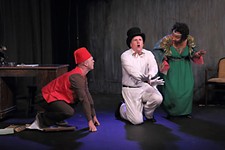The Imaginary Invalid
City Theatre's satire can't decide what – or when – it wants to be
Reviewed by Robert Faires, Fri., Aug. 12, 2011
The Imaginary Invalid
City Theatre, 3823-D Airport, 524-2870
Through Aug. 14
Running time: 2 hr., 25 min.
Molière knew that the health care system was broken 330 years ago. That's why the playwright jabbed it in the backside with a huge hypodermic full of ridicule, mocking the excessive treatments, the inflated costs, the greedy doctors, and the hypochondriacs who keep them in business. As those boils on the body politic remain with us and our nation is again engaged in a heated debate over how best to lance them, it's understandable that theatres across the land have raced to revive his 1673 satire.
Now, satire – you know, the thing that, as George S. Kaufman famously quipped, "closes on Saturday night" – has a distinct shelf life. To retain any topicality, it requires a freshening of its references, ripped-from-the-headlines names and events to provide a buzz of immediacy for contemporary audiences. Having been in a production of Invalid myself in the past year and seen a second – the two using very different new translations – I appreciate more keenly than ever the tweaks needed to keep this play's satire feeling sharp and of the moment. (That's also by way of full disclosure, so anyone who cares to may dismiss my comments as the "sour grapes" of a Molière-like misanthrope.)
City Theatre Company's production, which uses yet another translation (though uncredited in the program), appears to ride the current wave of interest in Invalid, and yet it can't decide what – or when – it wants its satire to be. Much of Andy Berkovsky's set and Kendi Erickson's costumes suggest a classical setting, but modern elements are interspersed throughout. When anachronisms in the show serve the script's satirical sensibilities – as when the commedia dell'arte clown Polichinelle serenades his love with the Streisand hit "Evergreen" and receives a cease-and-desist letter from ASCAP – they're delightful, but just as many appear to stem from the company's lack of resources and lack any purpose with regard to the play. (The inconsistent quality also keeps the period elements from satisfying as pure spectacle.)
The performances are likewise a hodgepodge of styles: commedia cartoonishness, 20th century naturalism, vaudeville schtick. Some work well enough individually – Richard Craig's Argan, the titular invalid, has an amusingly sour disposition, reacting to every line directed his way as if it carries the scent of curdled milk; Robert Frazier's Polichinelle boasts a light wryness; and Scot Friedman finds the funny bone with crisply articulated comical accents – but the styles don't always mesh comfortably. And with the unevenness of experience among the 17 actors, the whole doesn't cohere into either a classical or contemporary send-up. Karen Sneed's direction never flags, but the show periodically seems like it wants to race like a comic hot rod and instead it cruises like a station wagon.
Then there's an extended coda involving, of all people, Hillary Clinton. Granted, this honorable public servant is still much in the news, but her presence here clearly has more to do with her role as leader of the failed battle for health care reform during her husband's first term as president than her current role as secretary of state. Given the much more recent fight over health care in which she was not involved, this segment feels stale, like a leftover sketch from an 18-year-old Saturday Night Live. What might have provoked guffaws then inspires little but smiles now. This Invalid feels like a prescription that's lost much of its strength because it's passed its use-by date.











